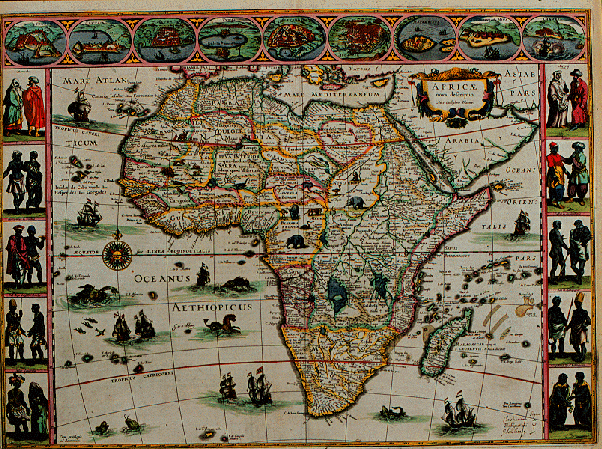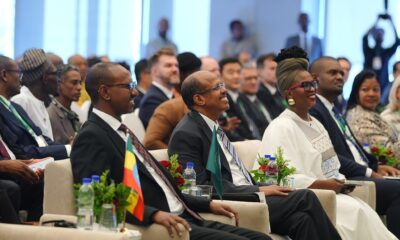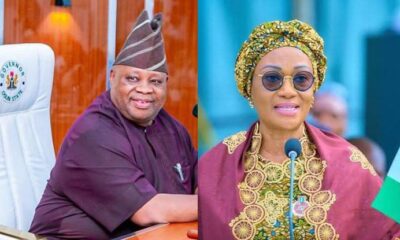Global Issues
Is Africa Truly Free from Colonialism?”: From Whom Should the Contemporary Africans Free Themselves -By Adimike John Owen
What we understand as our independence from the colonial supervisor is in reality, a bit of a hoax, geared only to placate rising agitation while giving them privy access to Africa’s resources through the puppeteering of the leaders who more often than not, are installed at their approval, behest, or sheer cunning scheme.

Introduction
In this work, there are quite a number of tasks to be performed. Firstly, I should declare what colonialism is and then, whether or not Africa is colonized—that is to say, whether or not Africa is free from the phenomenon of colonialism. To do so, I should also clarify what I mean by ‘freedom’ in this context. In answering this, I must then provide either an affirmative or negative answer to the question of Africa’s freedom from colonialism. In this work, I pursue the argument that maintains that Africa is not free from colonialism. Thus, I shall argue—as a response to the sub-titular probe of the paper—that Africans must free themselves from themselves. This is the structure of the argument I shall pursue and sustain in the subsequent paragraphs.
Clarification of Terms
In this section of my brief paper, I shall provide a conceptual clarification to those relevant words which will be frequently employed herein. I identify ‘Africa’, ‘colonialism’, and ‘freedom’. These words are the hinge on which the entire discussion I shall provoke turns and coagulates.
Africa, used in this work, is better encountered with the adjectival description of ‘contemporary’. Thus, contemporary Africans refer to the Africans living on the African tectonic plate since the days after the independence struggles and the initiation of professional philosophy, as well as the post-Great Debate. This period, in dated precision, falls from the 1990s till the date of the presentation of this paper. I use this description for contemporary because, the Nationalist-Idealist thinkers of Africa have prior to this date I provide, fought tooth and nail for the ‘freedom’ of Africa. If freedom is still the bone of contention in this paper, I do not think it proper to include an age that obviously fought for and obtained independence. Today’s Africans are fighting for a different cause; they seek freedom. Wherefore may it be found?
Colonialism in this paper, traces its meaning back to the roots of its etymology: French. The term was adopted from the French word colon meaning “settler”.[1]Colon originally referred to “a person, usually a farmer, who went to live in an area that his or her government wanted to control or to dominate. Later the word became the root of the word colonizer and was also applied to an administrator of a colony”.[2]With regards to policies, colons found themselves in fuzzy positions between their native governments and the indigenous people in the regions where they settled. The treatment they received from their governments was arbitrary: sometimes it benefited the government to protect them, and at other times, to oppress them[just as the colons oppressed the indigenous people].
Therefore, colonialism refers to an attitude of subjugation of an indigenous people by a foreign state without much regard for their welfare or tradition and, spurred from motives of exploitation and self-enrichment. It is the forceful [and somewhat uncivil] imposition of an alien culture upon a tribe of natives, co-opting the natives into strange ways of living and all against their wish. Europeans colonized Africans and imposed their own cultural practices upon the Africans. One could argue that the Europeans did not appreciate African culture, largely because it was not Christian.[3]Sponsored by racial and religious opinions, the European colonialists considered African culture as inferior just as they thought Africans themselves to be biologically, morally, and intellectually inferior.
Freedom is quite a term to define; most of the philosophical arguments about the meaning or the nature of freedom are concerned with the legitimacy or convenience of particular applications of the term. The most common definition of freedom is central in the tradition of European individualism and liberalism. In this tradition, “freedom refers primarily to a condition characterized by the absence of coercion or constraint imposed by another person…”.[4] By this definition, a person is said to be free to the extent of the command of choice of personal goals or courses of conduct, the choice between available alternatives, all without compulsion to act as one would not ordinarily choose to act, or be prevented from acting as one would ordinarily opt to, by the will of another man, of the state, or of any other authority. Freedom in this sense of not being constrained by another is oftentimes tagged negative freedom (or “freedom from”);it refers to an area of conduct within which each man chooses his own course and is protected from compulsion or restraint. I shall use this sense of freedom to describe Africa’s ‘freedom’ in relation to colonialism.
Is Africa Free from Colonialism?
Posterior to the conceptual examination I have just executed, it is apt to dedicate some few sentences in regard to the central problematic: whether or not Africa is free from colonialism. Given our definition of ‘freedom from’ which is concerned with the independence with which each man chooses his own course of action and is protected from compulsion or restraint. Therefore, the thesis to be wrestled with is whether or not Africans have the liberty or autonomy to choose their own course of actions that directly affect their socio-economic, politico-cultural, commercial, and survival relations.
To adequately address the aforementioned, we should consider what Africans expect their self-determination to comprise. The general sentiment usually involves some belief that Europeans still exploit today’s Africa; it is thought that “independence did not decolonize African countries and did not put an end to European exploitation”.[5]For Patrick Gathara, what we term independence—or decolonization, s’ilvous plait—is nothing more than the “internationalisation and indigenisation of colonialism”.
It is believed that the direct colonial competition for the natural resources superfluous in Africa has been replaced by an implicit supervision achieved through the puppeteering of the political heads of Africa in such a way that would allow Europe to largely benefit from the African continent’s natural resources—and quite unhindered—under the auspices of the European Union (EU): a situation now termed as neocolonialism.[6]Such claims are corroborated by utterances such as that of former UK Prime Minister Harold Macmillan who commissioned a cabinet committee to research on the influence of African independence “on the prestige and influence of the UK [and whether] premature withdrawal of United Kingdom jurisdiction would leave a vacuum, which would be filled by a country hostile to the United Kingdom and her Allies”.[7]
Of a truth, the aforementioned claims show—at least inductively—that Africa is not truly free from colonialism. What we understand as our independence from the colonial supervisor is in reality, a bit of a hoax, geared only to placate rising agitation while giving them privy access to Africa’s resources through the puppeteering of the leaders who more often than not, are installed at their approval, behest, or sheer cunning scheme.
From Whom Should the Contemporary Africans Free Themselves?
Granted that I have provided a negative answer to the question of Africa’s genuine freedom from the phenomenon of colonialism, it is imperative then to address the question of the identity of Africa’s true colonizer. While I do not gainsay the fact that the former colonial master has more than a power of influence in the decisions of African States, I am of the opinion that the true colonizer of contemporary Africans is none other than the contemporary Africans themselves.
The colonial masters infused a spirit of inferiority in the Africans they met in their day. This spirit made them feel less confident in their culture, person, and heritage. However, in the days immediately after World War II [1939-1945], most African intelligentsia began to stand up for their rights and owned up to anthropological equality. These educated Africans—like N. Azikiwe, T. Sankara, and P. Lumumba—had overcome the complex of cultural inferiority and challenged the colonial oppressor to the face. If there are any to complain of maltreatment from the colonial powers, these Nationalist-Idealists as they were later called, are the ones with such legitimate claims. But they did not. Rather, they fought for our own independence and instilled great patriotism and social piety in their countrymen.
The problem with contemporary Africans is that we have reverted to the culture of the colonial supervisor as being the decisive standard for what is civil or not. Our leaders have discarded any sort of national pride and official principle to the point of dithering to the dictates and direction of monetary promises and baits of luxury. The key to sustain our own independence and ‘genuine freedom’ is to adopt true selfless character. However, as is observable, many African societies display a great propensity to unchecked selfish appetite. With such a mentality, we are susceptible to manipulation by a clever operator. Thus, our leaders who have continued to display their ‘do-or-die’ attitude towards politics continue to fall into the attractive traps of the erstwhile colonial supervisors to be their alter ego among their fellow Africans: all for the enrichment of Europe and the subsequent impoverishment of Africa.
To buttress this point, I shall like to highlight China as a contrary instance. Lord Frederick Lugard who amalgamated the northern and southern protectorates into what is now Nigeria, was a Governor-general in Nigeria and also in China. This means Nigeria and Africa are contemporaries in terms of independence;[8]however, in terms of national development and gross development product, both countries are anything opposed to compeers. The national currency of China is a strong one in the international market. China is a formidable force in all ramification and, is currently competing with countries like the United States of America and the Russian Federation for the status of the ‘world power’. Chinese culture is respected, promoted within and without the national precincts, and the youth are well immersed into the traditional Chinese hegemony.
Why is the case different in Africa? Most African countries are within a twenty-year bracket of independence alongside China; why then is the story reversed in our own instance? Our youth are losing patriotism, our professionals are absconding the country with general testimonials of hatred, the population is gradually adopting a Western culture under the pretext of ‘globalisation’; what is the remedy for this ill? As I have argued herein, the colonizer of contemporary Africans is none other than the contemporary African. The elixir consists of defrocking our minds of a destructive consumerist and selfless attitude in favour of a genuinely patriotic and resolutementality—in such constitutes our freedom from our contemporary colonization.
Conclusion
At the dusk of the progression I have initiated so far, I deem it necessary to provide concluding remarks in the form of ultimate recommendations. The recommendation that I offer centres around the proposition that an elixir for the contemporary colonialism [neocolonialism] that is rampart in Africa today consists of the adoption of a genuinely patriotic and resolute mentality. The proposition that I make is that which most contemporary social-structure Pan-African philosophers will offer: a reversion to African Socialism.
African Socialism generally admits of an attitude of Ubuntu-nitude[9]which prescribes an atmosphere of familial correspondence with the ‘other’. To progress as an African society, we must be willing and begin to see the ‘other’ as a literal relative and not a figurative one. Putting the other in this context calls to mind the cultural factors and definiendum that one needs. As such, not only does one uphold the dignity of the person, check his appetite, but also develops a strong cultural consciousness and a corresponding patriotic spirit at large.
[1]“Colon”, in The Colonial Era (1850 to 1960), vol. 4 of Encyclopedia of African History and Culture, ed. R. Hunt Davis (New York: The Learning Source, Ltd., 2005), 91.
[2] “Colon”.
[3] “Colonialism, Influence of”, in The Colonial Era (1850 to 1960), vol. 4 of Encyclopedia of African History and Culture, ed. R. Hunt Davis (New York: The Learning Source, Ltd., 2005), 93.
[4] P. H. Partridge, “Freedom”, in Determinables to Fuzzy Logic, Vol. 3 of Encyclopedia of Philosophy, ed. Donald M. Borchert , 2nd ed. (Michigan: Thomson Gale, 2006), 721.
[5] Patrick Gathara, “Eurafrica and the Myth of African Independence”, in Aljazeera Opinion, published November 24, 2019; accessed October 24, 2022, https://www.google.com/amp/s/www.aljazeera.com/amp/opinions/2019/11/24/eurafrica-and-the-myth-of-african-independence.
[6] Neocolonialism also means the attitudinal assumption of Western worldview, outlook, and culture, as against the native and seminal traditions of one’s cultural hegemony.
[7] Gathara, “Eurafrica and the Myth of African Independence”.
[8] Both countries got their independence on an October 1st; that of China was in 1949, with Nigeria following suit exactly eleven years after.
[9] Anthony E. Okonkwo, “Ubuntu-nitude and Individuality as a Panacea to African Problems Today”, presentation at Zoom meeting, September 18, 2021.










